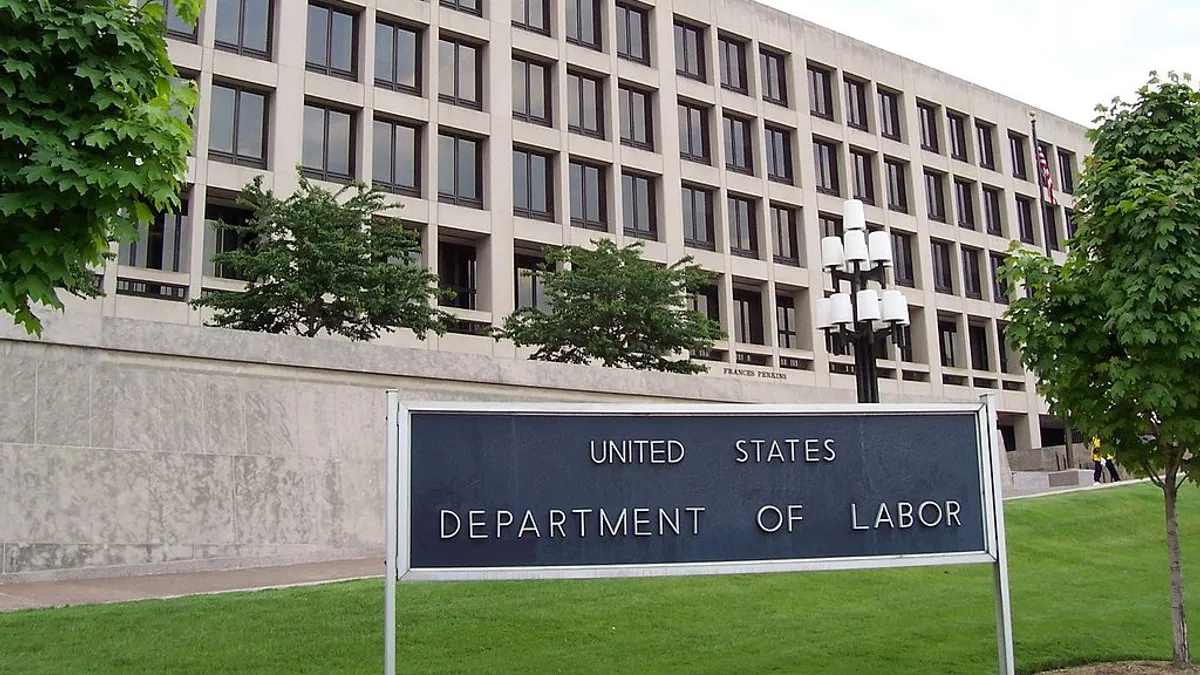Dive Brief:
- Health insurers are not required to cover COVID-19 testing for employer or surveillance-related purposes alone, three agencies clarified in new guidance this week.
-
The Departments of Health and Human Services, Labor, and the Treasury originally interpreted testing coverage requirements laid out by the Families First Coronavirus Response Act (FFCRA) and the Coronavirus Aid, Relief, and Economic Security (CARES) Act in an April 11 guidance. Those pieces of legislation broadly required insurers to cover COVID-19 diagnostic testing without patient cost-sharing or prior authorization.
-
Tuesday's 18-page frequently asked questions document in part addressed an open question among insurers about surveillance screening in workplaces. It says that "testing conducted to screen for general workplace health and safety (such as employee 'return to work' programs), for public health surveillance for SARS-CoV-2, or for any other purpose not primarily intended for individualized diagnosis or treatment of COVID-19 or another health condition" goes beyond the reach of FFCRA.
Dive Insight:
As regions of the U.S. reopen at varied paces, commercial test providers have turned to "return-to-work" packaging of services as a product for employers.
Quest Diagnostics and LabCorp each announced such products in May that include some combination of diagnostic and antibody tests, health questionnaires, temperature screens, contact tracing tools and certain telemedicine offerings. Fitbit and Verily announced their own versions of programs last week, and CVS Health joined their ranks Wednesday.
U.S. coronavirus legislation aimed to make diagnostic tests for the virus available at no cost to consumers in cases when an individual's healthcare provider determined testing need based on symptoms or suspected recent exposure to the virus. However, as for potential clients of workplace-oriented programs, Tuesday's guidance may raise questions as to how they will be paid for.
A strategy for some employers may simply be to ensure a provider is around to sign off on testing.
"It's not really black and white — it's not like workplace testing would never be covered," said Sabrina Corlette, co-director of the Center on Health Insurance Reforms at Georgetown University. "I think workplace testing would have to be covered if a provider is there to say 'yeah, these workers, there's potential that they've been exposed.'"
Questions will likely continue surrounding how the guidance applies to high-risk workplaces like meatpacking plants or nursing homes, Corlette noted. The American Clinical Laboratory Association raised similar concerns.
"For employees of nursing homes, meatpacking facilities, restaurants and others who rely on regular testing to keep their families and workplaces safe, for schools hoping to welcome students back to school in the fall, and for communities anxious to limit asymptomatic spread of the virus, coverage for COVID-19 testing is now in doubt," ACLA said in a statement late Tuesday.
"[T]he issue of how these tests will be paid for remains unclear. Laboratories cannot – and should not be expected to – absorb the costs for return to work and surveillance testing."
For months, the clinical labs lobby has argued testing providers such as Quest and LabCorp haven't received adequate support as they pour investment into quickly scaling COVID-19 operations and simultaneously saw revenues from routine testing drop sharply.
Along the way there have been funding wins for the sector, including a CMS decision in April to double the rate of reimbursement for high-throughput molecular tests to $100, and a subsequent decision in May to set the rate for common antibody tests at $42, which ACLA viewed favorably.
But certain thinking in the new tri-agency guidance marks a step backward, ACLA said. The organization is calling for Congress to designate funds to "close the gaps created by the tri-agency guidance, ensuring access to testing and fair reimbursement for laboratories for tests performed."











